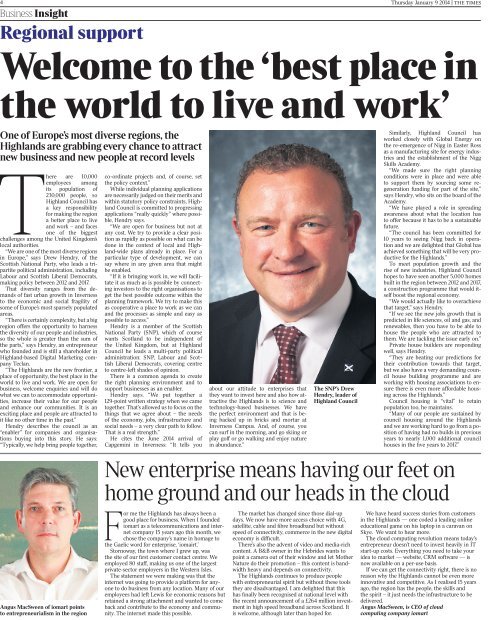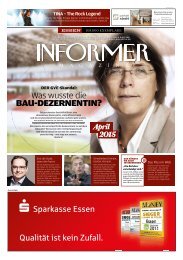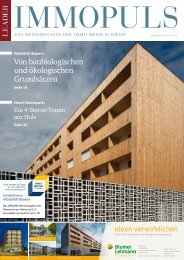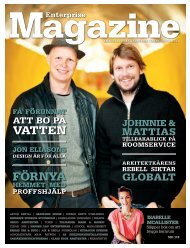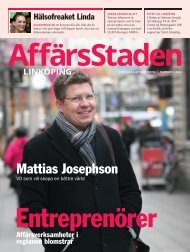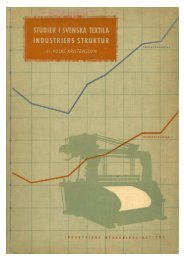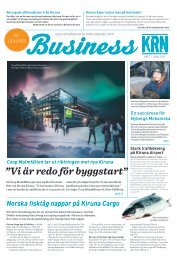Business Insight
The Highlands are a place of opportunity, the best place in the world to live and work, says Drew Hendry, leader of Highland Council. In this issue we look at the investment and vision creating this opportunity across the region. We start our journey in Inverness and at Inverness Campus, one of the largest projects that Highlands and Islands Enterprise (HIE) has embarked upon and one that is being hailed as a project of national importance. Brendan Dick, head of BT Scotland, discusses next generation broadband (NGB), its complexities and how it will benefit the people and businesses of the Highlands and Islands. We also go north to Caithness and Sutherland and discover why the run-down of nuclear activity is creating major opportunities for the area.
The Highlands are a place
of opportunity, the best
place in the world to live
and work, says Drew
Hendry, leader of Highland
Council. In this issue we
look at the investment and
vision creating this opportunity
across the region.
We start our journey in
Inverness and at Inverness
Campus, one of the largest
projects that Highlands and
Islands Enterprise (HIE)
has embarked upon and
one that is being hailed as
a project of national importance.
Brendan Dick, head of BT
Scotland, discusses next
generation broadband
(NGB), its complexities
and how it will benefit the
people and businesses of
the Highlands and Islands.
We also go north to
Caithness and Sutherland
and discover why the
run-down of nuclear
activity is creating major
opportunities for the area.
Create successful ePaper yourself
Turn your PDF publications into a flip-book with our unique Google optimized e-Paper software.
4<br />
<strong>Business</strong> <strong>Insight</strong><br />
Regional support<br />
Welcome to the ‘best place in<br />
the world to live and work’<br />
Thursday January 9 2014 | the times<br />
One of Europe’s most diverse regions, the<br />
Highlands are grabbing every chance to attract<br />
new business and new people at record levels<br />
here are 10,000<br />
employees among<br />
its population of<br />
230,000 people, so<br />
Highland Council has<br />
a key responsibility<br />
for making the region<br />
a better place to live<br />
and work – and faces<br />
one of the biggest<br />
challenges among the United Kingdom’s<br />
local authorities.<br />
“We are one of the most diverse regions<br />
in Europe,” says Drew Hendry, of the<br />
Scottish National Party, who leads a tripartite<br />
political administration, including<br />
Labour and Scottish Liberal Democrats,<br />
making policy between 2012 and 2017.<br />
That diversity ranges from the demands<br />
of fast urban growth in Inverness<br />
to the economic and social fragility of<br />
some of Europe’s most sparsely populated<br />
areas.<br />
“There is certainly complexity, but a big<br />
region offers the opportunity to harness<br />
the diversity of our people and industries,<br />
so the whole is greater than the sum of<br />
the parts,” says Hendry, an entrepreneur<br />
who founded and is still a shareholder in<br />
Highland-based Digital Marketing company<br />
Teclan.<br />
“The Highlands are the new frontier, a<br />
place of opportunity, the best place in the<br />
world to live and work. We are open for<br />
business, welcome enquiries and will do<br />
what we can to accommodate opportunities,<br />
increase their value for our people<br />
and enhance our communities. It is an<br />
exciting place and people are attracted to<br />
it like no other time in the past.”<br />
Hendry describes the council as an<br />
“enabler” for companies and organisations<br />
buying into this story. He says:<br />
“Typically, we help bring people together,<br />
co-ordinate projects and, of course, set<br />
the policy context.”<br />
While individual planning applications<br />
are necessarily judged on their merits and<br />
within statutory policy constraints, Highland<br />
Council is committed to progressing<br />
applications “really quickly” where possible,<br />
Hendry says.<br />
“We are open for business but not at<br />
any cost. We try to provide a clear position<br />
as rapidly as possible on what can be<br />
done in the context of local and Highland-wide<br />
plans already in place. For a<br />
particular type of development, we can<br />
say where in any given area that might<br />
be enabled.<br />
“If it is bringing work in, we will facilitate<br />
it as much as is possible by connecting<br />
investors to the right organisations to<br />
get the best possible outcome within the<br />
planning framework. We try to make this<br />
as cooperative a place to work as we can<br />
and the processes as simple and easy as<br />
possible to access.”<br />
Hendry is a member of the Scottish<br />
National Party (SNP), which of course<br />
wants Scotland to be independent of<br />
the United Kingdom, but at Highland<br />
Council he leads a multi-party political<br />
administration: SNP, Labour and Scottish<br />
Liberal Democrats, covering centre<br />
to centre-left shades of opinion.<br />
There is a common agenda to create<br />
the right planning environment and to<br />
support businesses as an enabler.<br />
Hendry says. “We put together a<br />
129-point written strategy when we came<br />
together. That’s allowed us to focus on the<br />
things that we agree about – the needs<br />
of the economy, jobs, infrastructure and<br />
social needs – a very clear path to follow.<br />
That is a real strength.”<br />
He cites the June 2014 arrival of<br />
Capgemini in Inverness: “It tells you<br />
about our attitude to enterprises that<br />
they want to invest here and also how attractive<br />
the Highlands is to science and<br />
technology-based businesses. We have<br />
the perfect environment and that is being<br />
backed up in bricks and mortar at<br />
Inverness Campus. And, of course, you<br />
can surf in the morning, and go skiing or<br />
play golf or go walking and enjoy nature<br />
in abundance.”<br />
The SNP’s Drew<br />
Hendry, leader of<br />
Highland Council<br />
Similarly, Highland Council has<br />
worked closely with Global Energy on<br />
the re-emergence of Nigg in Easter Ross<br />
as a manufacturing site for energy industries<br />
and the establishment of the Nigg<br />
Skills Academy.<br />
“We made sure the right planning<br />
conditions were in place and were able<br />
to support them by sourcing some regeneration<br />
funding for part of the site,”<br />
says Hendry, who sits on the board of the<br />
Academy.<br />
“We have played a role in spreading<br />
awareness about what the location has<br />
to offer because it has to be a sustainable<br />
future.<br />
“The council has been committed for<br />
10 years to seeing Nigg back in operation<br />
and we are delighted that Global has<br />
achieved something that will be very productive<br />
for the Highlands.”<br />
To meet population growth and the<br />
rise of new industries, Highland Council<br />
hopes to have seen another 5,000 homes<br />
built in the region between 2012 and 2017,<br />
a construction programme that would itself<br />
boost the regional economy.<br />
“We would actually like to overachieve<br />
that target,” says Hendry.<br />
“If we see the new jobs growth that is<br />
predicted in life sciences, oil and gas, and<br />
renewables, then you have to be able to<br />
house the people who are attracted to<br />
them. We are tackling the issue early on.”<br />
Private house builders are responding<br />
well, says Hendry.<br />
“They are beating our predictions for<br />
their contribution towards that target,<br />
but we also have a very demanding council<br />
house building programme and are<br />
working with housing associations to ensure<br />
there is even more affordable housing<br />
across the Highlands.”<br />
Council housing is “vital” to retain<br />
population too, he maintains.<br />
“Many of our people are sustained by<br />
council housing around the Highlands<br />
and we are working hard to go from a position<br />
of having had no builds in previous<br />
years to nearly 1,000 additional council<br />
houses in the five years to 2017.”<br />
Angus MacSween of iomart points<br />
to entrepreneurialism in the region<br />
New enterprise means having our feet on<br />
home ground and our heads in the cloud<br />
For me the Highlands has always been a<br />
good place for business. When I founded<br />
iomart as a telecommunications and internet<br />
company 15 years ago this month, we<br />
chose the company’s name in homage to<br />
the Gaelic word for enterprise, ‘iomairt.’<br />
Stornoway, the town where I grew up, was<br />
the site of our first customer contact centre. We<br />
employed 80 staff, making us one of the largest<br />
private-sector employers in the Western Isles.<br />
The statement we were making was that the<br />
internet was going to provide a platform for anyone<br />
to do business from any location. Many of our<br />
employees had left Lewis for economic reasons but<br />
retained a strong attachment and wanted to come<br />
back and contribute to the economy and community.<br />
The internet made this possible.<br />
The market has changed since those dial-up<br />
days. We now have more access choice with 4G,<br />
satellite, cable and fibre broadband but without<br />
speed of connectivity, commerce in the new digital<br />
economy is difficult.<br />
There’s also the advent of video and media-rich<br />
content. A B&B owner in the Hebrides wants to<br />
point a camera out of their window and let Mother<br />
Nature do their promotion – this content is bandwidth<br />
heavy and depends on connectivity.<br />
The Highlands continues to produce people<br />
with entrepreneurial spirit but without these tools<br />
they are disadvantaged. I am delighted that this<br />
has finally been recognised at national level with<br />
the recent announcement of a £264 million investment<br />
in high speed broadband across Scotland. It<br />
is welcome, although later than hoped for.<br />
We have heard success stories from customers<br />
in the Highlands — one coded a leading online<br />
educational game on his laptop in a caravan on<br />
Skye. We want to hear more.<br />
The cloud computing revolution means today’s<br />
entrepreneur doesn’t need to invest heavily in IT<br />
start-up costs. Everything you need to take your<br />
idea to market — website, CRM software — is<br />
now available on a per-use basis.<br />
If we can get the connectivity right, there is no<br />
reason why the Highlands cannot be even more<br />
innovative and competitive. As I realised 15 years<br />
ago, the region has the people, the skills and<br />
the spirit – it just needs the infrastructure to be<br />
delivered.<br />
Angus MacSween, is CEO of cloud<br />
computing company iomart


